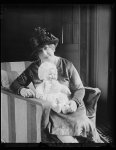Although other female inventors, such as the American chemists Ruth Benerito (1916-2013) and Giuliana Tesoro (1921-2002), achieved a larger number of patents (50 and 125, respectively), the merit of Beulah Henry is even greater, being of an autodidact.
The following female inventors can also be highlighted:
1. Hedy Lamarr (1914–2000), to whom we owe the technology that made wi-fi or Bluetooth networks possible.
2. Ada Lovelace (1815-1852), who created the first algorithm that would process the analytical engine (considered the first computer in history). She is considered the first computer programmer in history.
3. Alice H. Parker (1895-1920) designed a central heating system using natural gas as the fuel source. She became the creator of the first boiler, the forerunner of central heating and hot water systems.
4. Katharine Burr Blodgett (1898-1979), the first woman to work for the General Electric company. We can thank her, among other things, for the effectiveness of the sunglasses. Her best-known invention is the anti-reflective glass, used to make computer screens, car windshields, and camera lenses.
5. Ángela Ruiz-Robles (1895-1975), Spanish teacher, devised and patented a system of "mechanical, electrical and air pressure procedure for reading books" in 1949. It is what we know today as an e-book.
